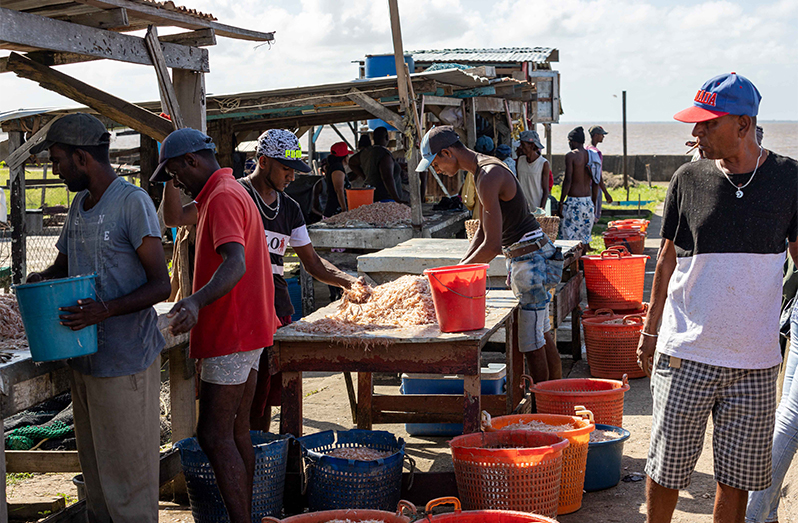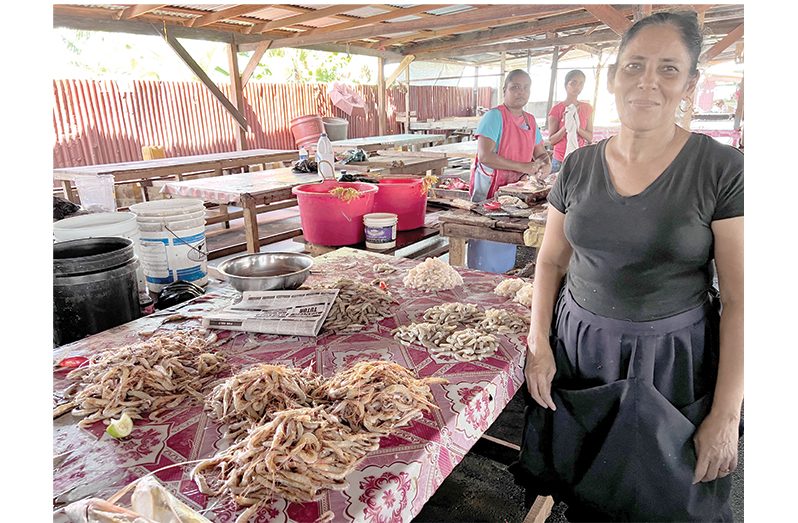– Supports safe, healthy work practices along seabob value chain
UNDER the FISH4ACP programme, the Food and Agriculture Organisation of the United Nations (FAO) is partnering with the Fisheries Department, the Guyana Association of Trawler Owners and Seafood Processors (GATOSP), the Guyana National Fisherfolk Organisation (GNFO) and other key stakeholders to develop and implement an OSH strategy for the Seabob value chain.
This initiative is timely as Guyana celebrates the month of Occupational Safety and Health (OSH) under the theme, “A Safe and Healthy Working Environment is a Fundamental Principle and Right at Work.”
Underscoring that the fishing industry is one of the most hazardous occupations globally, the FAO noted that casualties could arise from occupational hazards on the vessels; risk of capsizing, and operation of gear, nets, engines, ropes, and other equipment on board vessels.
Fisherfolk can also be exposed to viruses and bacterial contamination, harsh weather exposures, the risk of drowning, and psychological stressors such as insomnia, fatigue, stress, anxiety, and depression, to name a few.
Guyana is the world’s largest producer of Atlantic Seabob, a commercially valued shrimp harvested by trawlers and artisanal fishers.
An OSH strategy will improve the well-being of workers, improve operational safety and health standards, and build long-term sustainability and resilience in the seabob sector.
This industry-led strategy will also strengthen risk assessment and management practices along the seabob value chain while upgrading current policies and procedures to protect this fishery. Additionally, it will help export firms maintain compliance with national and international labour standards as required by the Ministries of Labour and Health in Guyana and comply with the labour requirements introduced by the Marine Stewardship Council (MSC) in 2022.
Maintaining MSC certification is essential for export market access. The new European Union regulations increasingly require exporting firms to demonstrate how they are meeting internationally recognised standards for labour practices.

“We the members of GATOSP welcome this initiative of the FAO FISH4ACP Project, as it will assist with the development of the OSH strategy for the seabob sector.
This will ensure that the revised policy meets not only the MSC certification process but also help them to meet the Ministries of Health and Labour OSH requirements,’’ GATOSP President Reuben Charles said.
The strategy development process commenced with an initial awareness and assessment of the current OSH conditions, policies, and regulations across the value chain. Following this, there will be a series of consultations among stakeholders for their input into a risk assessment and risk management manual. Trawler captains and crews, dock/transport workers, and seafood processing workers and managers will then be trained on the safety and health measures of the value chain operations.
Artisanal (Chinese Seine) seabob fishers will also receive training through the fisherfolk co-operatives on OSH and risk assessment to improve the lives of fishers at sea and on land.
The entire consultation, development, training, finalising, testing, and endorsement for implementation is expected to be completed within 18 months and handed over fully to the industry.
“The GNFO is in full support of the development of an Occupational Health and Safety strategy for the Seabob sector. This strategy will help the industry to meet national and international standards and also benefit the fishers who ply their trade in tough conditions by providing them with better awareness on health and safety at work and at the landing sites,” GNFO Chairman Pamashwar Jainarine said.
FISH4ACP is an initiative of the Organisation of African, Caribbean and Pacific States (OACPS) aimed at making fisheries and aquaculture value chains more sustainable. It contributes to food and nutrition security, economic prosperity and job creation by ensuring fisheries and aquaculture’s economic, social and environmental sustainability in Africa, the Caribbean and the Pacific. FAO implements FISH4ACP with funding from the European Union (EU) and the German Federal Ministry for Economic Co-operation and Development (BMZ).



.jpg)








